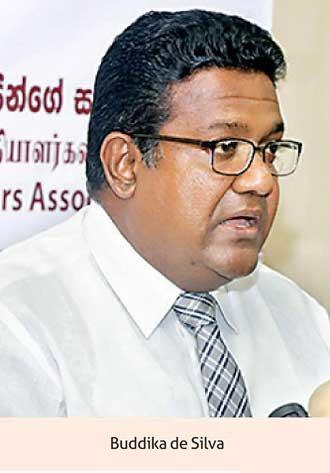10 Oct 2024 - {{hitsCtrl.values.hits}}
By Nishel Fernando
 Amid the growing concerns about the dumping of chemically refined oil labelled as coconut oil in the local market, the government is urged to establish a transparent mechanism to differentiate chemically refined oil from natural coconut oil.
Amid the growing concerns about the dumping of chemically refined oil labelled as coconut oil in the local market, the government is urged to establish a transparent mechanism to differentiate chemically refined oil from natural coconut oil.
The All Ceylon Traditional Coconut Oil Manufacturers Association (ACTCOMA) reported that 80,000 metric tonnes of processed oil, derived from refining, bleaching and deodorising (RBD), have entered the market and are being sold as coconut oil, in violation of the Sri Lanka Standards (SLS) classification.
“These oils are refined with chemicals such as sodium hydroxide and aluminum oxide, which likely contain residues of heavy metals that are carcinogenic and harmful to health,” said ACTCOMA Chief Convener Buddika de Silva at a press briefing in Colombo on Monday.
While the Sri Lankan authorities conduct random tests to determine the free fatty acid, iodine and aflatoxin levels in edible oils, de Silva emphasised that no tests are performed to detect heavy metals in these products.
According to the Sri Lanka Standards Institution (SLSI) classification, de Silva noted that there are clear categories for distinguishing naturally produced coconut oil from chemically refined coconut oil. However, he expressed concern that the importers are evading the SLSI guidelines and the authorities have not enforced compliance.
“The consumers have a right to know what kind of coconut oil they are consuming,” he stressed.
De Silva highlighted that Sri Lanka has laws in place to protect the consumers but the authorities are yet to demonstrate interest in implementing them. He indicated that the Consumer Affairs Authority, Coconut Development Authority and Health Ministry have the legal authority to address this issue.
He also criticised a recent statement from the Public Health Inspectors’ Union, which sought to reassure the public that there is no cause for concern regarding the imported coconut oil.
“How can they provide such an assurance when no specific tests have been conducted to determine the heavy metal residues in these imported oils? Some public officials appear to be acting as public relations representatives for corrupt importers,” he said.
De Silva denied the claims made by the Public Health Inspectors’ Union regarding a shortage of coconut oil in the country.
According to the ACTCOMA, there are over 2,500 local coconut oil producers, with 235 members in the association. These members have the capacity to produce 25,000 metric tonnes of coconut oil per month, double the local demand of 12,500 metric tonnes.
08 Jan 2025 21 minute ago
07 Jan 2025 7 hours ago
07 Jan 2025 7 hours ago
07 Jan 2025 8 hours ago
07 Jan 2025 07 Jan 2025